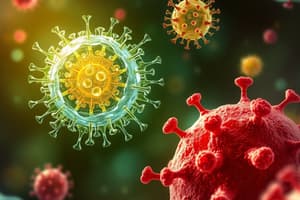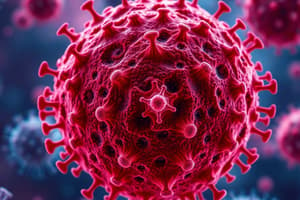Podcast
Questions and Answers
What type of immunity is characterized by its immediate response and lack of memory?
What type of immunity is characterized by its immediate response and lack of memory?
- Adaptive Immunity
- Natural Immunity
- Acquired Immunity
- Innate Immunity (correct)
Which of the following components is NOT part of innate immunity?
Which of the following components is NOT part of innate immunity?
- Natural Killer Cells
- Complement System
- Antibodies (correct)
- Phagocytes
What mechanism is primarily involved in the process of engulfing and destroying pathogens?
What mechanism is primarily involved in the process of engulfing and destroying pathogens?
- Antibody Production
- Inflammatory Response
- Opsonization
- Phagocytosis (correct)
Which type of lymphocyte is responsible for activating B cells?
Which type of lymphocyte is responsible for activating B cells?
Which statement accurately describes the characteristics of adaptive immunity?
Which statement accurately describes the characteristics of adaptive immunity?
Which class of immunity specifically involves B cells and antibody production?
Which class of immunity specifically involves B cells and antibody production?
What role do cytokines play in the immune response?
What role do cytokines play in the immune response?
Which of the following describes the function of Natural Killer (NK) cells?
Which of the following describes the function of Natural Killer (NK) cells?
Flashcards are hidden until you start studying
Study Notes
Immunology Study Notes
Innate Immunity
- Definition: First line of defense; non-specific response to pathogens.
- Components:
- Physical Barriers: Skin, mucous membranes, secretions (e.g., saliva, tears).
- Cellular Components:
- Phagocytes: Macrophages, neutrophils; engulf and digest pathogens.
- Natural Killer (NK) Cells: Target and destroy infected or cancerous cells.
- Molecules:
- Cytokines: Signaling proteins that mediate immune responses.
- Complement System: Series of proteins that enhance the immune response by opsonization and lysis of pathogens.
- Mechanisms:
- Inflammatory Response: Redness, heat, swelling, and pain as the body responds to injury or infection.
- Phagocytosis: Process by which phagocytes engulf and destroy pathogens.
- Characteristics:
- Immediate response (minutes to hours).
- Lacks memory; maintains consistent response regardless of pathogen exposure.
Adaptive Immunity
- Definition: Specific response to pathogens, develops over time, and has memory.
- Components:
- Lymphocytes:
- B Cells: Produce antibodies targeting specific antigens.
- T Cells:
- Helper T Cells (CD4+): Activate B cells and cytotoxic T cells.
- Cytotoxic T Cells (CD8+): Directly kill infected or cancerous cells.
- Lymphocytes:
- Mechanisms:
- Antibody Production: B cells undergo clonal selection and expansion to produce specific antibodies.
- Cell-Mediated Immunity: T cells recognize and attack infected cells.
- Characteristics:
- Delayed response (days to weeks) after first exposure.
- Memory: Subsequent exposures lead to a faster and stronger response.
- Types of Adaptive Immunity:
- Humoral Immunity: Involves B cells and antibody production.
- Cell-Mediated Immunity: Involves T cells targeting infected or abnormal cells.
Summary
- Innate Immunity: Rapid, non-specific response; physical barriers, phagocytes, NK cells.
- Adaptive Immunity: Slower, specific response; B and T cells with memory for future infections.
Innate Immunity
- Functions as the body's first line of defense against pathogens through a non-specific response.
- Physical Barriers: Includes skin, mucous membranes, and secretions like saliva and tears that prevent pathogen entry.
- Cellular Components:
- Phagocytes: Macrophages and neutrophils play a crucial role in engulfing and digesting harmful pathogens.
- Natural Killer (NK) Cells: Specialize in targeting and destroying infected cells and cancer cells.
- Molecular Components:
- Cytokines: Proteins that facilitate communication and regulation of immune responses among cells.
- Complement System: Comprises proteins that boost immune responses through pathogen opsonization and lysis.
- Mechanisms:
- Inflammatory Response: Characterized by redness, heat, swelling, and pain as the body coordinates a defense against injury or infection.
- Phagocytosis: A vital process where phagocytes engage and eliminate pathogens.
- Characteristics:
- Provides an immediate response within minutes to hours.
- Lacks immunological memory, ensuring a uniform response to repeated pathogen exposure.
Adaptive Immunity
- Develops a specific immune response against pathogens over time, allowing for a memory-based response.
- Components:
- Lymphocytes:
- B Cells: Responsible for producing antibodies that specifically target antigens.
- T Cells: Include two main types:
- Helper T Cells (CD4+): Facilitate the activation of B cells and other T cells.
- Cytotoxic T Cells (CD8+): Directly kill cells that are infected or malfunctioning.
- Lymphocytes:
- Mechanisms:
- Antibody Production: B cells undergo a process of clonal selection and expansion to generate specific antibodies against antigens.
- Cell-Mediated Immunity: T cells identify and attack compromised cells within the body.
- Characteristics:
- Initiates a delayed immune response that takes days to weeks after the first pathogen exposure.
- Exhibits memory; subsequent encounters with the same pathogen trigger faster and more robust immune reactions.
- Types of Adaptive Immunity:
- Humoral Immunity: Involves B cells and the generation of antibodies.
- Cell-Mediated Immunity: Involves T cells targeting and eliminating infected or abnormal cells.
Studying That Suits You
Use AI to generate personalized quizzes and flashcards to suit your learning preferences.



